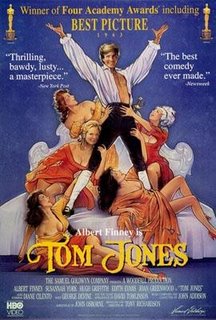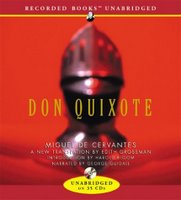Doing Battle with Tom Jones, Part 2

 At number 5 of The Guardian's 100 Greatest Novels of All Time sat Tom Jones. He seemed innocent enough. He'd even won an Oscar. How bad could he be?
At number 5 of The Guardian's 100 Greatest Novels of All Time sat Tom Jones. He seemed innocent enough. He'd even won an Oscar. How bad could he be?Beginning the book on October, 15, 2005 (in pursuit of the quest of reading all of The Guardian's 100 books) there is no way I could foresee that it would be April 3, 2006 before I finished its nearly 1000 pages. Although not the fastest reader around, my book journal revealed nearly 40 entries for 2005 before Henry Fielding's most notable work was opened.
This title is in no way more challenging than others I've attempted, but there was just something that kept me from sticking to it. Luckily my Type-A personality finally kicked in at the end of March and I slogged through the second half of it in a couple of weeks (enjoying only brief moments of the effort).
Maybe it was the travel. Although it accompanied me to a family vacation in Florida at the end of October and business trips to San Diego and Las Vegas, only a few pages passed during those flights before my eyelids instinctively drooped.
But I can't really blame traveling, the ramped-up intensity of work, or even the holidays. The book just blows. At the time of its publication, I'm certain the bawdy activities of its hero, the hypocrisy of his antagonists, and the overall theme of the Christian necessity of subjugating women were all enertaining themes. But today, it's just tame, tired stuff. And Fielding really didn't have much else to offer besides boring political and personal axes to grind.
That's a lot of garbage to spread across 1000 pages.
But I gladly accepted the final blow on this one — thanks to the film. After successfully crawling through the tome, I decided to watch the Oscar-winning movie — a complete farce that may be the worst entry to ever take the best pic nod.

Albert Finney — in the title role — is at least 10 years older (and about 15 pounds chubbier), than he should be, and the lineup of paramours he conquers is about as purposefully anti-Bond girl as you could get in the sixties.
If you're up for a memorable romp, grab a 12-pack and this DVD on a Friday night and wallow in its cheerful awfulness. If Fielding inspired nothing else, at least his work eventually succeeded in taking the air out of the Academy's stuffed shirt. Oscar wasn't so bamboozled again until The Lord of the Rings came along, but that's another story.
Oh crap. Guess what holds spot number 64 on The Guardian's list?


